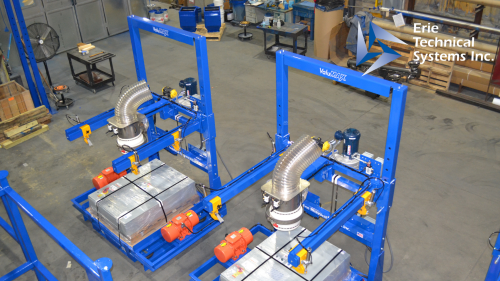When you're in the market for a bulk bag filling system, there are a handful of key points you'll want to keep in mind. It's about more than just picking the system – you need to ensure it's the right fit for your specific needs. In this guide, we'll walk through the most important factors to consider when choosing a bulk bag filling system. Whether you're dealing with food products, chemicals, or other materials, getting these considerations right can make a big difference in the performance of your system.
1. Material Characteristics:
The nature of the material being filled is a primary consideration. Different materials have varying flow properties, densities, and particle sizes, which can significantly impact the choice of filling system. For instance, free-flowing materials may require a different filling mechanism compared to more cohesive or sticky substances.
2. Bag Size and Capacity:
Bulk bags, also known as FIBCs (Flexible Intermediate Bulk Containers), come in various sizes and capacities. It's essential to choose a filling system that can accommodate the specific dimensions and weight capacities of the bags you intend to use. Consider future needs as well; a system that offers flexibility in bag size can be a wise investment.
3. FILLING SPEED AND ACCURACY
The filling speed and accuracy of the system are critical for maintaining productivity and ensuring consistent product quality. Assess your production requirements and select a system that can meet your desired filling rate without compromising on accuracy. Automated systems with weigh scales and precision controls can offer superior performance in this regard.
4. Dust Control and Containment:
In many industries, controlling dust emissions during the filling process is essential for safety and environmental compliance. Look for systems with dust-tight filling spouts, bag inflation devices, and integrated dust collection systems to minimize dust escape and maintain a clean working environment.
5. Ease of Operation and Maintenance:
A user-friendly bulk bag filling system can reduce operator training time and minimize the risk of errors. Features like intuitive controls, easy-access components, and quick-change mechanisms for different bag sizes can enhance operational efficiency. Additionally, consider the maintenance requirements of the system; a design that allows for easy cleaning and maintenance can reduce downtime and extend the life of the equipment.
6. Integration with Existing Equipment:
The bulk bag filling system should seamlessly integrate with your existing material handling and processing equipment. Compatibility with conveyors, hoppers, and other upstream and downstream components is crucial for a smooth and efficient workflow.
7. Safety Features:
Safety should always be a top priority. Look for systems with built-in safety features such as automatic shut-off mechanisms, overload protection, and secure bag attachment systems to protect operators and prevent accidents.
8. Customization and Scalability:
Every business has unique needs, and a one-size-fits-all solution may not be the best fit. A system that offers customization options, such as adjustable filling heads, modular designs, and the ability to add additional features as your needs evolve, can provide greater value in the long run.
9. Cost and Return on Investment:
While cost is an important consideration, it's essential to look beyond the initial price tag and evaluate the total cost of ownership and the potential return on investment. Consider factors such as energy efficiency, maintenance costs, and the potential for increased productivity when assessing the value of a bulk bag filling system. Check out our budgeting guide on bulk bag fillers for more detailed pricing information.
10. Vendor Reputation and Support:
Finally, choose a reputable vendor with a proven track record in providing reliable bulk bag filling systems. Comprehensive support services, including installation, training, and after-sales support, can ensure a smooth implementation and ongoing success.
Purchasing a bulk bag filling system is a significant investment that can impact your operations' efficiency, safety, and profitability. By carefully considering these essential factors, you can select a system that meets your specific needs and provides long-term value for your business. Remember to partner with a trusted vendor who can offer expert guidance and support throughout the selection process and beyond.

